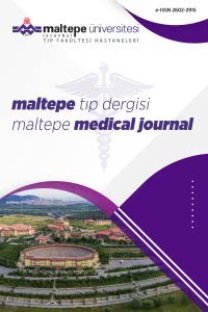Noninvaziv mekanik ventilasyonda deksmedetomidin ile sedasyonun etkileri
Amaç: Noninvaziv mekanik ventilasyon NIMV bazen hasta uyumsuzluğu ve başarısızlıkla sonuçlanabilmektedir. Bu çalışmada, NIMV desteği altındaki hastalarda; deksmedetomidinin sedatif etkisini ve noninvaziv mekanik ventilasyona uyum üzerindeki etkilerini araştırmak amaçlanmıştır. Materyal ve Metod: Hastalar rastgele iki gruba ayrılarak, deksmedetomidin uygulanacak grup ve kontrol grubu oluşturuldu. Deksmedetomidin grubunda Ramsey sedasyon skoru 3-4 olacak şekilde 0,2–0,7 μgr/kg/saat idame dozu ayarlandı. Deksmedetomidin başlandıktan sonra 1.dk, 10.dk, 30.dk, 1.saat, 4. saat, 24. saat ve herhangi bir nedenle infüzyon sonlandırıldığında veya noninvaziv mekanik ventilasyon sonlandırıldığında ortalama arter basıncı, kalp atım hızı, solunum frekansı, arter kan gazı, PaO2/FIO2 ve Ramsey sedasyon skoru değerleri kaydedildi. Bulgular: Noninvaziv mekanik ventilasyon desteği altındaki 30 ajite ve uyumsuz hasta değerlendirilmeye alındı. Deksmedetomidin D grubunda ortalama arter basıncı, kalp atım hızı ve solunum frekansı ölçümlerinde anlamlı düşüş tespit edildi. Deksmedetomidin grubunda Ramsey sedasyon skorlarında 1.dk göre 10.dk dan stoplama süresine kadar geçen zamanlarda istatistiksel olarak anlamlı yükseliş 1'den 3'e görüldü. Deksmedetomidin grubunda PaO2/FIO2 değerlerinde görülen yükseliş anlamlı bulundu. Sonuç: Noninvaziv mekanik ventilasyon gereksinimi olan hastalarda, Deksmedetomidin güvenli ve etkin bir sedatif ajandir.
Anahtar Kelimeler:
Dexmedetomidin, sedasyon, NIMV
The effects of dexmedetomidine based sedation for noninvasive mechanical ventilation
Aim:Noninvasive mechanical ventilation NIMV is associated with a large number of failures, and patient refusal. The purpose of the study was to assess the feasibilty and safety of dexmedetomidine during NIMV. Methods:The patients allocated randomly in to two groups; Dexmedetomidine D group and control C group. In D group, Dexmedetomidine infusion rate was set between 0,2-0,7 µgr/kg/hour to reach a Ramsey sedation score RSS between 3-4. Mean arterial pressure, heart rate, respiratory rate, blood gas analysis, PaO2/FIO2 and RSS documented at 1 min, 10 min, 30 min,1 hour, 4 hour, 24 hours after Dexmedetomidine infusion started and after the end of infusion and at non invasive mechanical ventilation support cessation in any reason. Result: Thirty patients under NIMV support with agitation and ventilatory dyssynchrony were included in this study. In D group mean arterial pressure, heart rate, respiratory rate measurements were significantly lower than C group. RSS shown significant rises 1 to 3 at the period between 1th min to 10th min to the cessation time in D group p
Keywords:
Dexmedetomidine, sedation, NIMV,
___
- Seyedow M, Neumann P. Sedation for the critically ill. Intensive Care Med 1999: 25; 634–636.
- Soliman HM, Mélot C, Vincent JL. Sedative and analgesic practise in the intensive care unit: re- sults of European survey. Br J of Anaesth 2001; 87:186–192.
- Jeffery C. Woods, Lorraine C :Mion, Jason T. Connor, Florence Viray et al. Severe agitation among ventilated medical intensive care unit patients: frequency, characteristics and out- comes. Intensive Care Med 2004; 30: 1066– 1072.
- Cristopher Young, Nancy Knudsen, Andrew Hilton, J.G. Reves. Sedation in the intensive care unit. Crit Care Med 2000: 28; 854-866.
- William D. Schweickert, Brian K. Gehlbach, Anne S. Pohlman Jesse B. Hall. Daily interrup- tion of sedative infusions and complications of critical illness in mechanically ventilated patients. Crit Care Med 2004; 32: 1272–1276.
- Mantz J. Alpha 2-adrenoceptor agonists: an- algesia, sedation, anxiolysis haemodynamics, respiratory function and weaning. Bailliére‘s Clinical Anaesthesiology 2000: 14; 433-448.
- Galves–Banda C, Meras–Sorio C A, Sánchez– Miranda G, Poblano–Morales M et al. Dexme- detomidine sedation in patients under non- invasive mechanical ventilation. With Poster 17 th Annual Congres–Berlin, Germany. 10-13 October 2004
- Patil N. Randomized controlled trial of Dexme- detomidine to treat acute intensive care unıt delirium. Crit Care Med 2006:34(12):47.
- Hall JE, Toni D. Uhrich, Jill A. Barney, Shahbaz R. Arain et al. Sedative, amnestic and analgesic properties of small-dose dexmedetomidine infisions. Anesth Analg 2000; 90: 699–705.
- Venn RM, Newman PJ, Grounds RM. A phase II study to evaluate the efficacy of dexmedeto- midine for sedation in the medical intensive care unit. Intensive Care Medicine 2002: 002; 1579-1579.
- Shehabi Y, Urban Ruettimann, Harriet Adam- son, Richard İnnes et al. Dexmedetomidine infüsion for more than 24 hours in critically ill patients: sedative and cardiovascular effects. Int Care Med 2004: 004–2417-z.
- Maze M, Angst MS. Dexmedetomidine and opioid interactions: Defining the role of Dex- medetomidine for intensive care unit sedation. Anesthesiolgy 2004: 101; 1059–1061.
- Yayın Aralığı: Yılda 3 Sayı
- Başlangıç: 2009
- Yayıncı: Maltepe Üniversitesi
Sayıdaki Diğer Makaleler
Torasik outlet sendromunun nedenini bulmak
Akut batında multiplanar reformat BT enterografi
Abdurrahim DUSAK, Bircan ALAN, Abdulmenap GÜZEL, Muharrem ÇAKMAK, Fatih TAŞKESEN, Cemil GÖYA, Aslan BİLİCİ
Muhtemel Sporadik Creutzfeldt-Jakob Hastalığında Herpes Simpleks Virüs Antikor Pozitifliği
Şevki ŞAHİN, Nilgün ÇINAR, Aslı KARADENİZ, Sibel KARŞIDAĞ
Parotis bezinde mukosel: Olgu sunumu
Özben YALÇIN, Fatih Mert DOĞUKAN, Fevziye KABUKÇUOĞLU
Noninvaziv mekanik ventilasyonda deksmedetomidin ile sedasyonun etkileri
Özgür ŞENTÜRK, Oktay DEMİRKIRAN, Tuğhan UTKU, Seval ÜRKMEZ, Yalım DİKMEN
